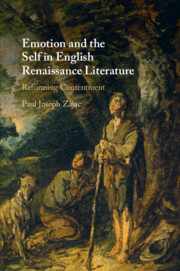
- Publisher:
- Cambridge University Press
- Online publication date:
- December 2022
- Print publication year:
- 2022
- Online ISBN:
- 9781009271653

This book offers the first full-length study of early modern contentment, the emotional and ethical principle that became the gold standard of English Protestant psychology and an abiding concern of English Renaissance literature. Theorists and literary critics have equated contentedness with passivity, stagnation, and resignation. However, this book excavates an early modern understanding of contentment as dynamic, protective, and productive. While this concept has roots in classical and medieval philosophy, contentment became newly significant because of the English Reformation. Reformers explored contentedness as a means to preserve the self and prepare the individual to endure and engage the outside world. Their efforts existed alongside representations and revisions of contentment by authors including Sidney, Spenser, Shakespeare, and Milton. By examining Renaissance models of contentment, this book explores alternatives to Calvinist despair, resists scholarly emphasis on negative emotions, and reaffirms the value of formal concerns to studies of literature, religion, and affect.
‘A valuable and timely contribution to the burgeoning study of the history of emotions, Emotion and the Self in English Renaissance Literature situates itself very effectively within this field and makes a strong case for the importance of contentment both as an emotion itself and as a fertile discursive territory in the English Renaissance. Paul Zajac advances our understanding by showing how important the positive emotion of contentment - overlapping with neo-Stoic ethics, but not the same - is to reformed Christian thinking.’
Mary Ann Lund - Associate Professor in Renaissance English Literature, University of Leicester
‘Paul Zajac assembles here a remarkable archive of contentment for the early modern period. His wealth of primary sources, his elegant negotiation of spiritual and political discourses of the self, and his bold analyses of a startling range of dramatic and poetic genres make Emotion and the Self in English Renaissance Literature essential reading in the scholarship on literature, religion, and the history of emotions.’
Heather Hirschfeld - The University of Tennessee, Knoxville
‘essential reading for any scholar interested in the role of affect in the shaping of English Renaissance literature and culture.’
Mathew R. Martin Source: Renaissance and Reformation
 Loading metrics...
Loading metrics...
* Views captured on Cambridge Core between 15th December 2022 - 9th April 2025. This data will be updated every 24 hours.
Usage data cannot currently be displayed.